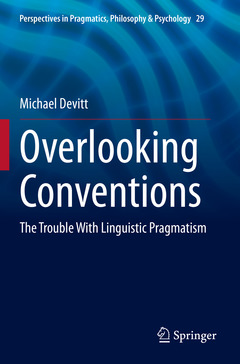Overlooking Conventions, 1st ed. 2021 The Trouble With Linguistic Pragmatism Perspectives in Pragmatics, Philosophy & Psychology Series, Vol. 29
Auteur : Devitt Michael

This book criticizes the methodology of the recent semantics-pragmatics debate in the theory of language and proposes an alternative. It applies this methodology to argue for a traditional view against a group of ?contextualists? and ?pragmatists?, including Sperber and Wilson, Bach, Carston, Recanati, Neale, and many others. The author disagrees with these theorists who hold that the meaning of the sentence in an utterance never, or hardly ever, yields its literal truth-conditional content, even after disambiguation and reference fixing; it needs to be pragmatically supplemented in context.
The standard methodology of this debate is to consult intuitions. The book argues that theories should be tested against linguistic usage. Theoretical distinctions, however intuitive, need to be scientifically motivated. Also we should not be guided by Grice?s ?Modified Occam?s Razor?, Ruhl?s ?Monosemantic Bias?, or other such strategies for ?meaning denialism?. From this novel perspective, the striking examples of context relativity that motivate contextualists and pragmatists typically exemplify semantic rather than pragmatic properties. In particular, polysemous phenomena should typically be treated as semantic ambiguity. The author argues that conventions have been overlooked, that there?s no extensive ?semantic underdetermination? and that the new theoretical framework of ?truth-conditional pragmatics? is a mistake.
Michael Devitt is a Distinguished Professor of Philosophy at the Graduate Center of CUNY. He is the author of the following books: Designation (1981); Realism and Truth (1984/1991/1997); Language and Reality (with Kim Sterelny, 1987/1999); Coming to Our Senses (1996); Ignorance of Language (2006); Putting Metaphysics First (2010); Biological Essentialism (forthcoming). He has co-edited (with Richard Hanley) The Blackwell Guide to the Philosophy of Language (2006)
Criticizes the reliance on intuitions in theorizing about language
Proposes a scientifically sound methodology for the semantics/pragmatics dispute
Identifies the common confusion of what constitutes what is said, meant, etc., with the epistemological issue of how we tell what a speaker said, meant, etc
Date de parution : 10-2022
Ouvrage de 326 p.
15.5x23.5 cm
Date de parution : 10-2021
Ouvrage de 326 p.
15.5x23.5 cm
Thème d’Overlooking Conventions :
Mots-clés :
Semantics vs Pragmatics; What is Said; Truth-conditional Pragmatics; Semantic Underdetermination; Modified Occam’s Razor; Sperber and Wilson; Linguistic Pragmatism/Contextualism; Linguistic Methodology; Modified Occam’s Razor; Linguistic Conventions; What is Said; Dead Metaphors; Sub-sententials



